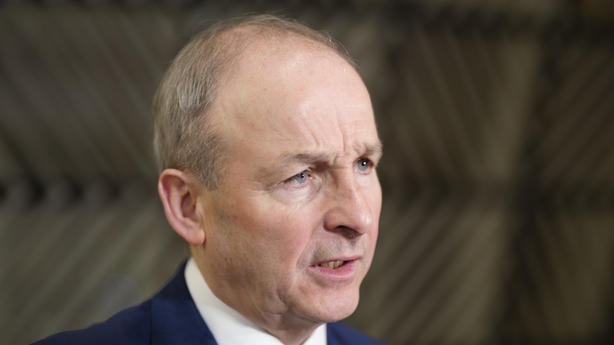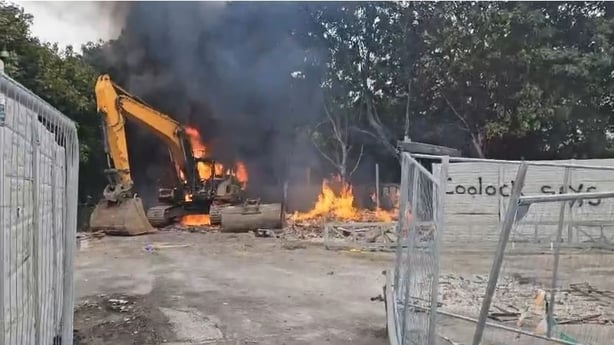Tánaiste Micheál Martin has said lessons need to be learned following the issues raised by the RTÉ Investigates documentary Inside the Protests broadcast last night.
The programme, which was shot over six months, recorded the behaviour and activities of people protesting against accommodation for migrants.
Mr Martin said the Government needed to reflect on whether or not the criminal justice system should be reviewed in terms of combating the type of behaviour depicted.
He said he was appalled at the intimidation directed at an RTÉ reporter which, he described as, "a threat to democracy".

Mr Martin said that there had been a significant number of arrests arising from protests at the former Crown Paints factory in Coolock, north Dublin, and people were still before the courts.
He said: "The State does need to learn lessons from what happened in Coolock. I watched it [Inside the Protests] last evening, I was uncomfortable with what I saw.
"I know the gardaí have issued very strong statements accounting for what transpired over those few days and overall about 200 gardaí were involved, but this is a relatively new phenomenon in Ireland in terms of the degree to which people they can take control of given environments, or take the law into their own hands.
"We do need to reflect on whether our criminal justice system needs a review in terms of combating the type of behaviour we saw on RTÉ Investigates last evening."
Read more:
Standing down unit before Coolock riots was wrong decision - Harris
Inside the Protests: Cameras capture moment Coolock site attacked
The Tánaiste said democracy depended on the media being able to go about its business and there could be no tolerance of any interference with reporting of events.
Mr Martin said people were not getting away with what they did and would not get away with what they did.
He said the days of - what might be termed - "a traditional garda response" were over.
Mr Martin said that the garda commissioner was responsible for operational responses and that judgement calls had to be made on a case-by-case basis when it comes to such events like those seen in Coolock.
He said that in terms of the situation in Coolock, clearly people were at risk and one person was injured.
The Tánaiste said that it was important to reflect also on hate and vile commentary and ask where it is coming from.
"It's a matter of really grave concern," he added.
McEntee 'absolutely determined' to make sure justice system works
The Minister for Justice described the level of racism, vitriol, aggression and violence in the RTÉ investigates programme last night as "quite disgusting and quite sad".
Helen Mc Entee said when you have this behaviour normalised, such as former US president Donald Trump making such vile comments about migrants, then we as a society have to push back.
She said it was a small group of people who do not reflect or speak for the vast majority of us, but it was sad to see that small minority think its appropriate.
Ms McEntee also said she was absolutely determined to make sure the justice system works effectively and efficiently and those responsible for any type of crime are brought to justice.
She said bodycams on gardaí will make it easier to secure evidence and convictions.
She said 24 new judges had been appointed in the past two years and she intended to appoint 20 more to increase court sittings and make the system more effective.
The minister also said she was introducing legislation for facial recognition technology on CCTV and legislation to ban face coverings to identify people more quickly.
She said work on the facial recognition technology was underway and she planned to bring legislative proposals to cabinet within weeks
Ms McEntee added that the proposals for banning face coverings would be before Cabinet within weeks but the development of legislation would take more time.
However, she could not say when that would be made law and whether it would be done before the dissolution of the Dáil, which means the proposed legislation on these issues would fall.
We need your consent to load this rte-player contentWe use rte-player to manage extra content that can set cookies on your device and collect data about your activity. Please review their details and accept them to load the content.Manage Preferences
'Scare tactics' intimidating for gardaí - Leahy
Former garda assistant commissioner Pat Leahy said "scare tactics" by protesters against gardaí were intimidating, and were having a negative effect on guards, some who are young men and women with families.
He said that there was a need to deal with that, potentially through legislation.
He told RTÉ's Today With Claire Byrne: "This is not part of the normal protest approach, although it is becoming such".
He said that in the case of Coolock, uniform gardaí were left exposed for too long and were not equipped to deal with violence on the front line.

"We were putting them in harm’s way, and last night it appeared to me that they left exposed for too long. That was a job for the public order unit," he added.
A retired garda inspector and former head of the Garda National Diversity Unit said that in a protest type environment, a police officer is like a referee and has to make sure that both sides are treated fairly.
Dr Dave McInerny said gardaí have to ensure people can "enjoy their rights equally".
He told the same programme: "We don't allow one element impinge upon the rights of the majority.
"It's about fair policing techniques."
Dr McInerny noted that every garda has a helmet and said he did not understand why gardaí were not wearing helmets at the protests or did not bring shields for their own safety.
